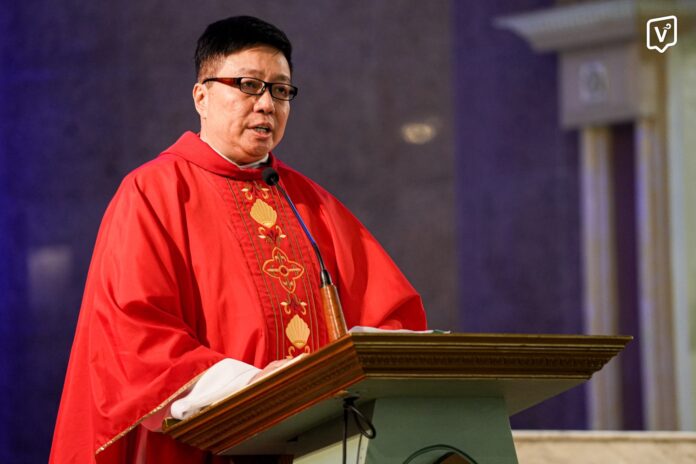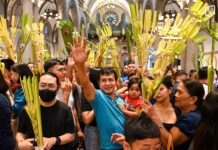
UST Rector Fr. Richard Ang, O.P. said being fragile or “marupok” happens in times of trials but stressed the importance of rising up and standing strong in his homily at the Santisimo Rosario Parish Church on Good Friday, March 29.
During the parish’s commemoration of the Lord’s passion, Ang said it is inevitable to feel helpless at times.
“May mga pagkakataong tatalikod tayo sa ating mga pangako at magiging marupok,” he said. “May mga oras na hindi tayo nagiging tapat sa ating sinumpaan at hindi natin napapanindigan na ating mga prinsipyo, hindi man natin ito sinasadya.”
“With sin we fall, but with contrition and conversion we rise.”
The Rector also underscored that while starting strong is good in fulfilling promises with God, “finishing strong is epic.”
“[Jesus] is courageous and majestic like a king all throughout. He is ever in a dignified command of the situation and there is no unfinished business,” he said.
Referencing Jesus’ experience at Golgotha, Ang said Catholics should be compassionate, regardless of their physical and emotional suffering, like Simon of Cyrene who helped Jesus carry the cross.
“Kapag tayo’y may pinagdadaanan, nakapagbibigay pa rin ba tayo na pagmamalasakit sa mga taong nakapaligid sa atin?” Ang said. “Sana habang tayo’y nabubuhay, kahit tayo’y nakakaranas ng pagdurusa at paghihirap paminsan-minsan, sana iaalay natin ito sa ngalan ng pag-ibig, sa ating mga minamahal sa buhay.”
Siete Palabras
In the annual “Siete Palabras” or reflections on the Seven Last Words of Christ at Santo Domingo Church in Quezon City on Good Friday, Dominican preachers urged the faithful to confront life’s challenges with forgiveness, hope, and complete trust in God.
Fr. Christian Dale Dakila of the Diocese of San Pablo, Laguna, cautioned Christians against blaming others to avoid confronting their problems.
“[K]apag nasaktan tayo at kapag nahihirapan tayo, ang halos laging unang ginagawa natin ay hanapin ang sisisihin,” he said.
“Pagdating kay Hesus, ang pinakaunang wika niya, pagpapatawad. Ang kanyang unang pagkilos, pagpapatawad. At ang kanyang unang panalangin ay pagpapatawad pa rin.”
Fr. Arden Xerces Dacuma, O.P., secretary of the Dominican Province of the Philippines, said Catholics should demonstrate openness to contrition and conversion, even when facing death.
“[M]alinaw at maliwanag na sinasabi sa atin ni Hesus na ‘yong paraiso ay bukas, hindi nawawala, at madaling matagpuan para sa mga taong handang humingi ng kapatawaran at handang magbalik-loob sa Diyos sa kahit anumang yugto ng kanyang buhay at kahit pa sa bingit ng kanyang kamatayan,” Dacuma said.
Former UST rector Fr. Rolando de la Rosa, O.P., urged the faithful to dedicate their full presence and availability to God.
“Give God your precious presence. Give Him your availability. Give Him one moment of love and He will love you for all eternity,” De la Rosa said.
Former UST vice rector Fr. Virgilio Ojoy, O.P., suggested that Catholics should hope for eternal life and not simply lament their sufferings.
“Hindi niya tayo hahayaang manatili sa kadiliman, sa pagdurusa o kalungkutan. Hindi niya tayo iiwanang nakalibing sa kamatayang walang hanggan. Aakayin niya tayo sa muling pagkabuhay,” Ojoy said.
Citing Jesus’ thirst in His crucifixion, Santo Domingo parish priest Fr. Simon Peter Ramos, O.P., called on the faithful to confront their problems directly instead of opting for convenient alternatives.
“Tayo, mahilig tayong tumakas lalo na sa pain. We take painkillers—video games, forbidden relationships and the like. Doon lang tayo sa masarap at sa kung saan ang ginhawa. Ramos said. “Paano ka magiging malakas kung palagi kang tumatakas? It is only you who can kill the pain. You yourself is the painkiller.”
UST theology professor Leo-Martin Ocampo said that not all endings are negative, as problems also come to an end.
“Hindi lahat ng pagtatapos ay masakit o mapaiit. Dati ang dami natin problema, parang wala nang katapusan. Ngayon kahit papaano nakakaraos na at marami sa mga problema ang akala natin hindi na matatapos, natapos na.”
Fr. Jerone Geronimo, O.P., an instructor from the Ecclesiastical Faculties, concluded the Siete Palabras by saying that no one, not even Jesus Christ, is exempt from suffering.
“Madadapa tayo at maipapako tayo,” he said. “At tulad ni Kristo, mababayubay tayo. Walang exempted sa atin.”
The newly ordained priest emphasized the importance of trusting God amid suffering.
“Ang pagpapaubaya sa Ama ay ‘di lamang dasal, kung hindi pang-araw-araw na aksyon at desisyon,” he said. Sheila May S. Balagan and Ammiel B. Maestrado with reports from Jenna Mariel A. Gonzales and Ralent M. Penilla













